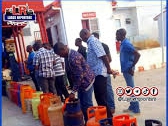With alarming surge in the price of cooking gas for which 12.5 kg for instance goes for between N17,000 amd N18,000, a feeling of despondency and hopelessness are being aroused among Nigerians, who watch as their right to existence is gradually being wiped out.
Similarly, inflation hike resurfacing, with September readings at 32.70 percent, driven by food prices remaining a key driver and climbing to 37.77 per cent, according to the nation’s Statistics Bureau (NBS), would mean most people are merely existing taken only the availables.
More worrisome is the fact that the increase in food inflation, according to NBS, is largely attributed to rising prices of staples such as rice, maize, beans, and yams, which used to be the exclusive preserves of the lower and middle classes, signifies some Nigerians are living in a bipolar world as the middle class is gradually being extinct, creating a Nigerian society of only the few afluence, who are not only in government but also in power controlling and appropriating the nation’s resources for their interests.
Over the years, cooking gas has been seen as a more efficient alternative to traditional methods like firewood and charcoal.
However, the recent price hike has forced many to revert to these older, often more time-consuming, environmentally harmful practices.
Unfortunately, the charcoal which used to be for the masses, particularly at the rural areas, have become unaffordable as prices have equally gone up astronomically with a bag going for between N20,000 and N25,000.
With kerosine selling for over N1000/litre when and if available, daily living of the lower class can only be imagined than described, according to some analysts.
ALSO READ:GTBank’s IT Upgrade Hardship Lingers, Unsettles Customers
Although NBS says the price of 12.5kg of liquefied petroleum gas (LPG), better known as cooking gas, increased by 69.15 percent in one year and that Nigerians paid an average price of N15,552.56 for a 12.5kg cylinder of cooking gas in the month of August, compared to the N9,194.41 in August 2023, metrobusinessnews.com (MBN) gathered thst the retail prices are higher and dependent on the locations
For instance, according to the report and based on the state profile analysis, the data body said Rivers recorded the highest average retail price for refilling a 12.5kg cooking gas cylinder at N17,086.36, followed by Cross River (N17,050) and Abia (N17,012.52).
Oladokun George, a caterer in Magboro, Ogun State, shared his frustration, adding that the most agonising aspect is the fact that, the product burns faster than usual, adding that ‘I suspect either inferior products are being Imported or the fillings are faulty. You can imagine buying a 12.5 kg for N17,500, only to last for two weeks, even then i don’t use it maximally for lack of customers.”
“Even, when I don’t cook everyday my refilled 5kg cylinder of cooking gas at N8,430.02 could not take me for one month. This is terrible,” says a disgruntled civil servant.
Despite the federal government’s announcement of the removal of Value Added Tax (VAT) from the commodity since October last year, the prices of cooking gas have failed to drop considerably.
Experts say the foreign exchange volatility in the country has spiked the LNG price as importers find it difficult to access needed funds for the importation of the product.
“Rising international prices, high tax rates and prices of vessels, forex scarcity, and naira devaluation are some of the reasons for the current increase,” says an energy analyst.
According to him, the situation is quite unfortunate because prices are going higher. Nigerian consumers are passing through very difficult times because they can no longer afford gas.
Nigeria has about 209 trillion cubic feet (TCF) of gas under the ground, but the country is unable to fully explore the natural resource due to low investment in the sector.
